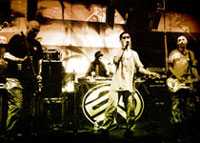Asian Dub Foundation are 21st century MIDI warriors. Their distinctive sound is a combination of hard ragga-jungle rhythms, indo-dub basslines, searing sitar- inspired guitars and 'traditional' sounds gleaned from their parents' record collections, shot through with fast-chat conscious lyrics.
1998's album 'Rafi's Revenge' on London Records met with much critical acclaim and received a Mercury Prize nomination. By that time already considered one of Britain's most exciting live bands, this album helped to introduce them to a wider audience.
ADF talk not only about racism and the experience of Asians in Britain, but are concerned with wider issues of social justice. Their outlook is informed by their continued involvement with campaigning and educational groups. Their music is also intended to encourage peoples' own creativity.
They started off in 1993 at London based organisation Community Music where bassist Dr Das taught music technology. He teamed up with one of his students, rapper Deeder Zaman and civil rights worker DJ Pandit G to form a sound system to play at anti-racist gigs. The following year they recruited guitarist Chandrasonic and started moving further afield. With Sun-J joining in 1995 on live technology and 'radical movements,' the line up was complete.
Their debut album 'Facts and Fictions' (Nation Records) came out in 1995 and was largely overlooked by a country obsessed with retro guitar pop. And at that time, to be 'Asian' was yet to be considered 'cool.' On the continent however, ADF were given ample opportunity to tour and develop their performance skills. Their musical and lyrical package was met with considerable enthusiasm, especially in France where their second album 'R.A.F.I.' was released by Virgin France in 1997. The following year's 'Rafi's Revenge' was in fact a re-recorded, recharged version of R.A.F.I, energised through extensive live playing.
It was Primal Scream who finally brought ADF to the attention of the British media. ADF toured the UK with them in the summer of 1997 having by now signed to London. The Primals also collaborated with ADF on the single 'Free Satpal Ram,' which has done much to draw attention to the situation of an Asian man whom they both believe is yet another recipient of British rough justice.
ADF spent most of 1998 touring, consolidating their reputation for uplifting live sets and for attracting culturally mixed audiences. In Britain, Primal Scream's championing of ADF was soon vindicated. Journalists were taken aback by their energy and made inadequate comparisons to well known previous punk bands. Little did they realise, that aside from having played in front of mad French audiences, it was their own ignoring of the band that had made ADF focus in such a way. ADF performed at many major festivals in the UK and the rest of Europe as well as at Fuji Rock in Japan. A Beastie Boys support tour in the autumn introduced them to the US where they received a warm welcome, much to their own surprise.
ADF's forceful presence has helped to demolish many stereotypes of Asian musicians and by extension, Asian people. An acknowledgement of this came in the form of the BBC Asian Award for Music in December 1998.
Their higher profile enabled ADF to attract funding from the London Arts Board to establish ADF Education (ADFED) to promote and practice the teaching of music and technology to young people. ADFED now functions as an independent organisation running various workshops in London.
ADF did their first headlining tour of the US and Canada in the Spring of 1999 getting an excellent response, with the majority of the dates being sold out. Their album received good exposure on the independent college radio circuit, often receiving top ten placings in the airplay charts.
They have completed their third album 'Community Music' which will be released in March 2000, named of course after the place where they started and out of respect to their ethnically and culturally diverse 'outernational' fanbase.
